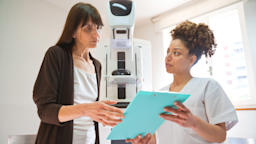Key takeaways:
Medicare pays for breast magnetic resonance imaging (MRI) scans and breast ultrasounds if your doctor determines they’re medically necessary. This could include diagnosing or treating conditions.
Medicare no longer covers breast ultrasounds and breast MRIs as screening tests — even though mammograms can miss tumors in dense breasts. Previously, Medicare covered breast ultrasounds with no cost sharing for women with dense breasts. But breast ultrasounds are now considered diagnostic. Only mammograms are covered at no out-of-pocket costs for breast cancer screening.
People with dense breasts may have to pay for a closer look at their breasts, such as with an ultrasound or an MRI. You can get a self-pay fast breast MRI, which is less costly than a full MRI and averages about $250. Expect to pay up to $500 for a breast ultrasound.
Mammograms are the most common type of breast cancer screening. They are used for early detection of breast cancer for people of all genders. Original Medicare and Medicare Advantage plans cover screening mammograms. We’ll talk about the specific circumstances later.
Ultrasound and magnetic resonance imaging (MRI) scans can follow your screening mammogram. These are used when your screening mammography shows something unusual or concerning.
For years, women with dense breasts had screening mammograms and ultrasounds covered with no cost sharing. Beginning in 2024, only mammograms are covered by Medicare for breast cancer screening because Medicare now considers breast ultrasounds diagnostic studies.
Search and compare options
Diagnostic breast ultrasound and MRIs may be covered by Medicare or Medicare Advantage. They must be considered medically necessary, such as to evaluate or follow up an unusual finding. But they are not covered for breast cancer screening. That means you are likely to have to self-pay for these tests if you do them for screening purposes only.
Does Medicare cover breast ultrasounds and MRIs?
Ultrasounds
Medicare covers medically necessary breast ultrasounds. This includes diagnostic breast ultrasounds but not breast cancer screening ultrasounds. A medically necessary test means your healthcare professional has ordered the test to diagnose or treat a condition. Previously, Medicare covered screening ultrasounds for women with dense breasts.
For Medicare to cover a breast ultrasound, a mammogram must show concerning findings. If your screening reveals only dense breast tissue, Medicare won’t cover a follow-up ultrasound. Medicare sees this use of ultrasound as breast cancer screening. Medicare covers screening mammograms only once per year for women age 40 and older.
That means that you may have to pay out of pocket for a breast ultrasound. Some Medicare Advantage plans may cover breast ultrasound screening. Check your summary of benefits and coverage, or contact your health plan to be sure.
MRIs
Medicare covers a breast MRI only if it’s medically necessary. This means your healthcare professional needs it for a diagnosis or treatment. MRIs are not covered for breast cancer screening.
A breast MRI can help with the early detection of breast cancer, especially if you have dense breasts. But Medicare doesn’t cover this MRI if dense breasts are the only finding on mammograms.
Basic breast cancer screening cost. Without insurance, you can expect to pay less than $200 to more than $300 for a 2D screening mammogram.
Where to get a free mammogram if you qualify. You may be able to get a free mammogram from safety-net hospitals, breast cancer organization no-cost screening programs, and free clinics.
Tests for dense breast tissue. If you have dense breasts, you may need a 3D mammogram, breast ultrasound, or breast MRI to adequately detect breast cancer.
That means that you may have to pay out of pocket for a screening breast MRI. Some Medicare Advantage plans may cover breast MRI screening. Check your summary of benefits and coverage, or contact your health plan for clarification.
What are dense breasts?
Dense breasts describes breast tissue that contains more glandular and fibrous tissue than fatty tissue. About 50% of women have dense or very dense breast tissue. You can’t feel whether a breast is dense, but a mammogram can show this finding. Mammograms are less effective at spotting breast cancer in dense breasts.
As of September 2024, mammography centers must notify you if you have dense breast tissue. The imaging facilities also must tell you that dense breasts are a risk factor for breast cancer. This is because breast density makes breast cancers harder to find on mammograms. They’ll also let you know that other breast imaging tests may help find cancers.
Read more like this
Explore these related articles, suggested for readers like you.
Experts still recommend that people with dense breasts get screening mammograms. But they specifically recommend 3D digital mammograms for people with dense breasts. In some cases, breast MRIs and breast ultrasounds are recommended after screening mammograms.
When does Medicare cover breast MRIs?
Medicare covers some diagnostic breast MRIs. To be covered, you need to have concerning findings on a mammogram or a biopsy.
Medicare will cover your breast MRI when:
You have scar tissue that looks the same as tumors.
You have signs or symptoms of cancer, but it’s unknown where the condition started.
You had a breast implant rupture.
Your healthcare professional needs to know how much cancer has spread before starting treatment.
This is not an exhaustive list. There may be other reasons why your healthcare professional will order a diagnostic breast MRI that will be covered by Medicare.
When does Medicare cover breast ultrasounds?
Medicare covers diagnostic breast ultrasounds if a healthcare professional deems them medically necessary. A diagnostic breast ultrasound (also called breast sonography) may be medically necessary when:
A mammogram detects masses, but it’s not clear if they are cysts or potentially cancerous breast tissue.
You are lactating or pregnant.
Your healthcare professional can feel abnormalities during a physical exam.
Your healthcare professional is trying to determine if you need a breast biopsy.
You don’t always need a screening mammogram or a diagnostic mammogram first. Medicare may still cover your breast ultrasound. But you need a definite reason from a healthcare professional. Your ultrasound can’t be used for breast cancer screening.
Does Medicare cover other types of breast screenings?
Medicare Part B and Medicare Advantage plans cover one baseline mammogram in your lifetime for women ages 35 to 39. They also cover screening mammograms every 12 months for women 40 and older. These preventive services are free.
Mammograms are typically 2D images. But women with dense breasts may benefit from 3D screening mammograms. A recent study of over 1 million women showed that 3D mammograms are more effective. They also give fewer false positives than a 2D mammogram.
Medicare pays for 3D imaging as long as a 2D digital screening is done at the same time. Not all mammogram facilities and hospitals have 3D mammograms.
How can you check if Medicare will cover your screenings?
Medicare covers a baseline screening mammogram for women ages 35 to 39. Annual screening mammograms are covered for women 40 and older. Diagnostic mammograms, breast ultrasounds, and breast MRIs are covered when medically necessary. If you have questions about Medicare coverage for these tests, ask your healthcare professional.
Which Medicare plans cover breast ultrasounds and MRIs?
Medicare Part B and Medicare Advantage plans cover breast MRIs and ultrasounds when medically necessary. Under original Medicare, you pay 20% coinsurance after meeting your Part B deductible. In 2024, the Part B deductible is $240.
On average, a Medicare enrollee pays $73 for a medically necessary breast MRI at a hospital and $39 at an ambulatory surgery center.
Your out-of-pocket costs vary with Medicare Advantage plans. They will be higher if you use an out-of-network imaging center.
How much do breast ultrasounds and MRIs cost without insurance?
Without insurance, national averages for breast ultrasounds range from $114 to $172. But you could be charged $450 for this test. Breast MRIs can cost about $922, but you could pay less for a fast breast MRI.
Fast breast MRIs
Abbreviated breast MRIs, or fast breast MRIs, are gaining popularity with women who have dense breasts. The exam lasts 10 minutes. Fast MRIs are typically self-pay. These scans are usually not covered by Medicare and other insurance plans. They cost $250 on average — but can be more than $500.
What resources can help you pay for ultrasounds and MRIs?
Medigap, financial assistance programs, and healthcare credit cards can help with out-of-pocket costs for breast ultrasounds and MRIs. These are options when your health plan doesn’t cover them fully or you don’t have health insurance. Here’s a closer look at each.
Medicare supplement insurance (Medigap): If you have original Medicare, a Medigap plan can help you cover out-of-pocket costs. These include copays and coinsurance for diagnostic tests.
Safety-net hospitals and clinics: Public hospitals and essential hospitals provide services regardless of your health insurance status. These facilities deliver billions of dollars in uncompensated care to uninsured people. Search this list to find a safety-net hospital, a public hospital, or an essential hospital.
Financial assistance programs: Many hospitals and imaging centers offer financial assistance programs or indigent care programs. These can reduce your fees based on income. Contact the facility’s billing department to learn about available programs.
Medical credit cards: Medical credit cards can give you the opportunity to pay for healthcare services over time. This can make healthcare more affordable for you.
Frequently asked questions
Regardless of whether you have Medicare, another insurance plan, or no insurance, you could be charged a self-pay price for a screening other than a mammogram. Previously, many people with dense breasts would have a breast ultrasound or an MRI when they had their mammogram. There was no cost sharing. Recent Medicare coverage changes mean you may have to pay for breast screening beyond the mammogram. Ask about coverage of screenings in addition to the mammogram when you make your appointment. You can find out how much you will be expected to pay out of pocket. Ask about discounts or financial assistance programs. Indigent care programs at hospitals also can help reduce your costs.
If you have a medically necessary reason for another scan, Medicare will cover a breast ultrasound or breast MRI. This is considered a diagnostic nonlaboratory test. After you meet your Part B deductible, Medicare will pay 80%, and you’ll pay 20%. Your coverage and out-of-pocket costs may be different with a Medicare Advantage plan.
Medicare won’t cover a breast ultrasound for breast cancer screening. Previously, a screening ultrasound was covered for someone with dense breasts. Medicare now provides coverage only for diagnostic breast ultrasounds. That means you need a medical reason for testing beyond a screening mammogram. Even then, you won’t get that ultrasound without cost sharing. You’ll still need to meet your Part B deductible before Medicare pays 80% and you pay 20%. Your out-of-pocket costs may be different if you have a Medicare Advantage plan.
Regardless of whether you have Medicare, another insurance plan, or no insurance, you could be charged a self-pay price for a screening other than a mammogram. Previously, many people with dense breasts would have a breast ultrasound or an MRI when they had their mammogram. There was no cost sharing. Recent Medicare coverage changes mean you may have to pay for breast screening beyond the mammogram. Ask about coverage of screenings in addition to the mammogram when you make your appointment. You can find out how much you will be expected to pay out of pocket. Ask about discounts or financial assistance programs. Indigent care programs at hospitals also can help reduce your costs.
If you have a medically necessary reason for another scan, Medicare will cover a breast ultrasound or breast MRI. This is considered a diagnostic nonlaboratory test. After you meet your Part B deductible, Medicare will pay 80%, and you’ll pay 20%. Your coverage and out-of-pocket costs may be different with a Medicare Advantage plan.
Medicare won’t cover a breast ultrasound for breast cancer screening. Previously, a screening ultrasound was covered for someone with dense breasts. Medicare now provides coverage only for diagnostic breast ultrasounds. That means you need a medical reason for testing beyond a screening mammogram. Even then, you won’t get that ultrasound without cost sharing. You’ll still need to meet your Part B deductible before Medicare pays 80% and you pay 20%. Your out-of-pocket costs may be different if you have a Medicare Advantage plan.
The bottom line
Medicare now covers mammograms only for breast cancer screenings. Medicare doesn’t cover breast ultrasounds or MRIs as screenings for breast cancer. The tests aren’t covered for women with dense breasts if there are no abnormal or inconclusive findings on your mammogram.
Having dense breasts makes it harder to find breast cancers on a mammogram. In the past, people with dense breasts were offered ultrasound and MRI at no cost. But now, unless there’s a medical reason, you’ll have to pay for these additional screening tests. If there’s a change in your mammogram or a mass that can be felt, the ultrasound and MRI may be covered.

Why trust our experts?



References
America’s Essential Hospitals. (n.d.). Our members.
America's Essential Hospitals. (n.d.). The value of membership.
American College of Radiology. (n.d.). Breast density and you.
American College of Radiology. (2021). ACR appropriateness criteria: Supplemental breast cancer screening based on breast density.
Blake, S. (2024). Medicare refusing to pay for cancer scan sparks warning for patients. Newsweek.
Centers for Disease Control and Prevention. (2023). About mammograms.
Centers for Medicare & Medicaid Services. (2023). Breast imaging mammography/breast echography (sonography)/breast MRI/ductography.
Centers for Medicare & Medicaid Services. (2023). Medigap (Medicare supplement health insurance).
Conant, E. F., et al. (2023). Mammographic screening in routine practice: Multisite study of digital breast tomosynthesis and digital mammography screenings. Radiology.
DePolo, J. (2020). Fast breast MRI seems to find more cancers in dense breasts than 3D mammogram. BreastCancer.org.
Federal Register. (2023). Mammography quality standards act. U.S. Food and Drug Administration.
Garfield, R., et al. (2019). The uninsured and the ACA: A primer - key facts about health insurance and the uninsured amidst changes to the Affordable Care Act. KFF.
Grimm. L. J., et al. (2021). Implementation of abbreviated breast MRI for screening: AJR expert panel narrative review. American Journal of Roentgenology.
Maldonado, Z. (2024). Some patients with Medicare are now being charged for breast ultrasounds, physicians say. CBS News.
MDSave. (n.d.). MRI breast(s) with and/or without contrast.
Medicare.gov. (n.d.). Costs.
Medicare.gov. (n.d.). Diagnostic non-laboratory tests.
Medicare.gov. (n.d.). Magnetic resonance imaging with contrast, breast; bilateral.
Medicare.gov. (n.d.). Mammograms.
Moffitt Cancer Center. (n.d.). Abbreviated breast MRI.
National Cancer Institute. (2024). Dense breasts: Answers to commonly asked questions. National Institutes of Health.
Rabin, R. C. (2024). Some older women need extra breast scans. Why won’t Medicare pay? The New York Times.
UnitedHealthCare. (n.d.). Medicare coverage for mammograms.
University Hospitals. (n.d.). Fast breast MRI screenings.
U.S. Department of Health and Human Services. (2024). Medicare & you 2024. Centers for Medicare & Medicaid Services.
Uscher, J. (2024). What is breast MRI? BreastCancer.org.
Weill Cornell Imaging. (2024). The power of prevention: How breast imaging can detect cancer early and changes with Medicare.

















